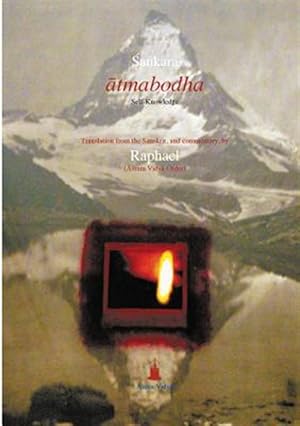ATMABODHA (Self-Knowledge) is a deeply explanatory text on the essence of the Advaita Vedanta Teaching. Shankara addresses those who have purified themselves through the practice of austerity, attained peace in their hearts, are liberated from all fear, and are freed from the desires of the senses and who now aspire to just one thing: identity with the Being-without-a-second.
For Advaita Vedanta what imprisons us is avidya or metaphysical ignorance. It is therefore only through 'knowledge' of a metaphysical order that we can defeat ignorance concerning the nature of Being. This Knowledge implies a deep transformation, a realizative sadhana whose phases are only moments of transformation-transfiguration of the entity following the unfolding of realizations, i.e. 'recognitions. And this is so because the entity is already in itself absolute Consciousness.
SANKARA is regarded as one of the pre-eminent philosophical minds in the history of India. He realized the most perfect synthesis and harmonization of the entirety of Indian philosophical thought. His "method" for the research of Truth, which consisted primarily in liberating it from the veils that cover it, has given a contribution of great value to the metaphysical philosophical thought of the entire world. Sankara is considered from many perspectives a philosopher, a mystic, an exegete of the Sruti, a founder of monastic orders (mathas), an Avatara (Siva's incarnation). But above all, he is to be considered as the supreme Instructor (Acarya) who was able to indicate the true and supreme end of human existence, based on Knowledge, and which constitutes the very end of the Upanisad: the recognition of our own real nature and liberation (moksa) from samsara-becoming.
Raphael having attained a synthesis of Knowledge (with which eclecticism or syncretism are not to be confused) aims at 'presenting' the Universal Tradition in its many Eastern and Western expressions. He has spent a substantial number of years writing and publishing books on spiritual experience, and his works include commentaries on the Qabbalah, Hermeticism and Alchemy. He has also commented on and compared the Orphic Tradition with the works of Plato, Parmenides and Plotinus. Furthermore, Raphael is the author of several books on the pathway of non-duality (Advaita), which he has translated from the original Sanskrit, offering commentaries on a number of key Vedantic texts. After more than sixty years of teaching, both oral and written, Raphael has withdrawn into mahasamadhi.
